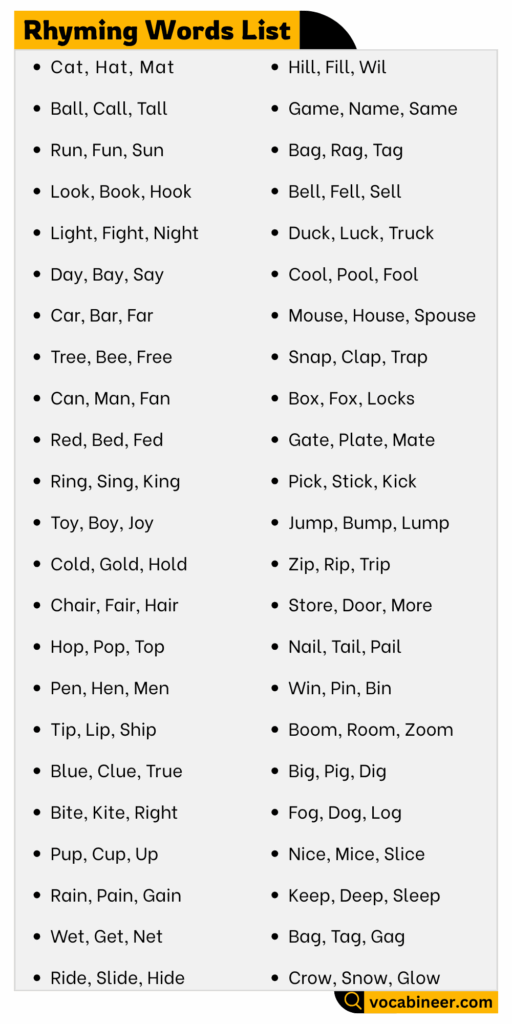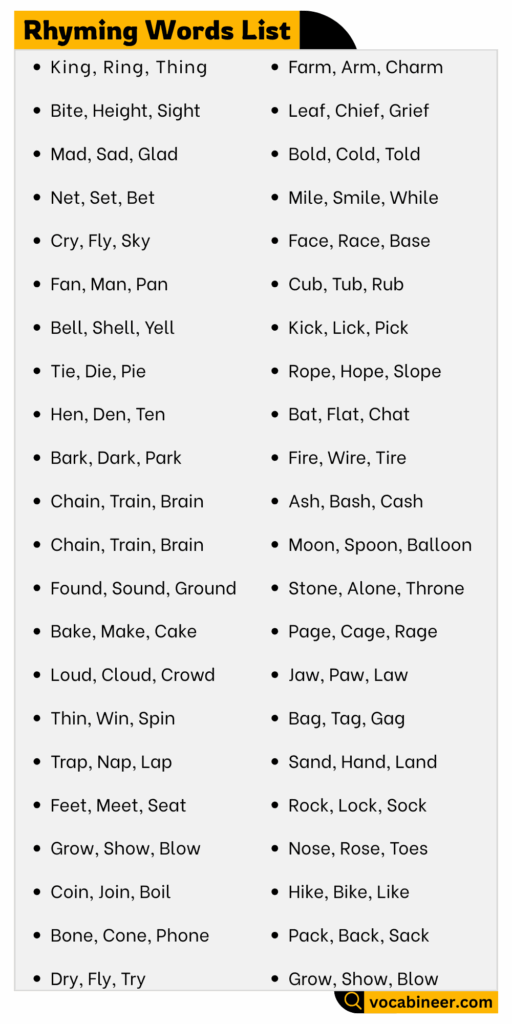Rhyming words are words that end with the same sound. They are often used in songs, poems, and rhymes to make the lines sound smooth and musical. In English, there are different types of rhyming words, like perfect rhymes, slant rhymes, and eye rhymes, based on how the sounds match. Learning rhyming words in English with types and examples helps improve pronunciation, grow vocabulary, and build strong reading and listening skills.
In This Page
What Are Rhyming Words in English?
Rhyming words are words that have the same or similar ending sounds. These are also called sound-alike words, similar sounding words, or end rhyme words. In most cases, the rhyming part begins with the vowel sound and continues to the end of the word.
Rhyming words help with sound recognition, reading fluency, and pronunciation. For example:
- cat — hat
- book — look
- play — day
Why Are Rhyming Words Important in English Learning?
Rhyming words play an important role in learning English. They help learners understand how sounds work together in words.
Below are the main reasons why rhyming is important:
- Phonics: Rhyming strengthens the connection between sounds and letters.
- Literacy: Rhymes appear often in stories and poems, helping early readers.
- Vocabulary building: Rhyming teaches new words in groups.
- Fluency: Saying rhymes improves speaking flow and sound patterns.
- Pronunciation: Rhymes highlight how words sound in English.
- Poetry and music: Rhymes give rhythm to songs, poems, and verses.
Types of Rhyming Words in English
Below is a list of rhyme types in English, each explained with clear terms and examples.
Perfect Rhyme (Full Rhyme)
A perfect rhyme (or full rhyme) is when two words have the same ending sound, starting from the last strong vowel.
Examples:
- Cat – Hat
- Play – Stay
- Light – Night
- Sky – High
- Call – Ball
- Look – Cook
- Rain – Pain
- Mouse – House
- Fast – Last
- Tree – Free

Slant Rhyme (Near Rhyme / Half Rhyme)
A slant rhyme (also called a near rhyme or half rhyme) is when two words sound almost the same, but not exactly. Often, only the consonants or vowels match.
Examples:
- Shape – Keep
- Worm – Swarm
- Bridge – Grudge
- Hold – Bald
- Gone – Alone
- Cut – Mat
- Push – Crush
- Heart – Start
- Dream – Warm
- Tell – Toll
Eye Rhyme (Visual Rhyme)
An eye rhyme is when two words look like they rhyme because of their spelling, but they sound different when spoken.
Examples:
- Love – Move
- Bough – Tough
- Laughter – Daughter
- Come – Home
- Said – Paid
- Flood – Good
- Sword – Word
- Bear – Hear
- Lead – Read (present tense vs past tense)
- Seem – Seam
Identical Rhyme
An identical rhyme is when two words sound and look exactly the same. Poets use them to make strong effects, but too many can feel repetitive.
Examples:
- Rain – Rain
- Fly – Fly
- See – See
- Night – Night
- Love – Love
- Star – Star
- Day – Day
- Run – Run
- Light – Light
- Heart – Heart
Rich Rhyme
A rich rhyme is when two words sound the same but have different meanings.
Examples:
- Raise – Raze
- See – Sea
- Peace – Piece
- Flower – Flour
- Night – Knight
- Write – Right
- Heel – Heal
- Son – Sun
- Mail – Male
- Allowed – Aloud
Internal Rhyme
Internal rhyme happens when words rhyme inside the same line of a poem or sentence, not just at the end.
Examples:
- “I went to town to buy a crown.”
- “The light of the fire made me tire.”
- “She sells seashells by the seashore.”
- “The rain in Spain falls mainly on the plain.”
- “I heard the bird sing in the word.”

End Rhyme vs Internal Rhyme
End Rhyme:
Rhyme at the end of lines.
- Example: The sky is high. So am I.
Internal Rhyme:
Rhyme within the same line.
- Example: The cat in the hat sat flat.
Words that Rhyme in English
Here’s set of rhyming word lists for emotionally expressive or poetic words like dream, hope, pain, heart, cry, and more.
Words that Rhyme with You
These rhymes with you are perfect for romantic or emotional expressions.
- blue
- true
- new
- through
- too
- who
- cue
- due
- shoe
- view
- chew
- glue
- crew
- few
- do
- zoo
Words that Rhyme with Love
Use these rhymes with love for heartfelt poetry and lyrics.
- above
- dove
- glove
- of
- shove
- thereof
Words that Rhyme with Heart
These words rhyme with heart and are great for emotional or poetic lines.
- start
- part
- chart
- smart
- dart
- art
- apart
- depart
- impart
- restart
Words that Rhyme with Life
Use these to reflect on life’s journey, challenges, or joys.
- knife
- strife
- wife
- rife
- fife
- midlife
- afterlife
Words that Rhyme with Night
Perfect rhymes for writing about dreams, darkness, or reflection.
- light
- bright
- fight
- sight
- might
- height
- kite
- tight
- bite
- white
Words that Rhyme with Dream
Use these for writing about goals, fantasy, or vision.
- beam
- gleam
- stream
- seem
- team
- scheme
- theme
- esteem
- supreme
- redeem
Words that Rhyme with Hope
Ideal for uplifting or motivational writing.
- cope
- rope
- slope
- mope
- elope
- scope
- dope
- telescope
- antelope
- envelope
Words that Rhyme with Pain
Powerful for emotional writing or dramatic poetry.
- gain
- rain
- train
- main
- plain
- brain
- chain
- strain
- lane
- reign
Words that Rhyme with Cry
Use these for sorrowful or introspective poetry.
- fly
- sky
- high
- lie
- bye
- my
- why
- dry
- sigh
- try
Words that Rhyme with Tears
Great for poems about sadness, growth, or personal struggle.
- fears
- years
- peers
- cheers
- gears
- appears
- volunteers
- engineers
- careers
- disappears
Rhyming Words for Kids and Beginners
Below is a list of simple rhyming words for those learning English:
- cat — bat, hat, mat, sat, rat
- dog — log, fog, hog, jog
- sun — fun, run, bun, gun, none
- top — hop, mop, stop, pop, shop
- ball — call, fall, hall, mall, tall
- pen — ten, hen, men, den, then
- cake — bake, lake, make, rake, take
- book — look, hook, cook, took, nook
- bell — fell, sell, tell, well, yell
- light — fight, night, right, sight, tight
How to Identify Rhyming Words in English
To know if two words rhyme, follow these tips:
- Listen for the ending sound: Rhyming starts at the vowel of the last syllable.
- Use phonetic clues: Words with the same ending syllable often rhyme.
- Say the words out loud: Sound comparison is key.
- Use dictionaries or rhyme tools: Many apps and sites list rhymes.
- Look for stress: Rhymes work best when stress is on the same syllable.
Rhyming Words vs Homophones: What’s the Difference?
Rhyming Words:
- End with the same sound.
- Example: cat — hat
Homophones:
- Sound exactly the same but have different meanings and spellings.
- Example: bare — bear, to — two — too
So, all homophones rhyme, but not all rhymes are homophones.
Benefits of Learning Rhyming Words
Rhyming helps in many ways:
- Builds language rhythm
- Improves sound recognition
- Supports phonological awareness
- Strengthens memory and learning
- Boosts spelling and reading
Conclusion
Rhyming words help with sound, reading, and speech. By learning different types like perfect rhyme, slant rhyme, and internal rhyme, you can better understand how English works. Use rhymes to build vocabulary, improve fluency, and enjoy English in songs and stories.
FAQs About Rhyming Words
Words like cat and hat are rhyming words—they end with the same sound.
Perfect rhyme, slant rhyme, eye rhyme, rich rhyme, and internal rhyme.
Rhyme is about sound match at the end of words. Rhythm is about beat and flow of speech.
Yes. For example: blue and true.
Yes, they do because they sound the same, but they are spelled differently.
No, they are used in songs, books, reading practice, and speech improvement.
Read More

